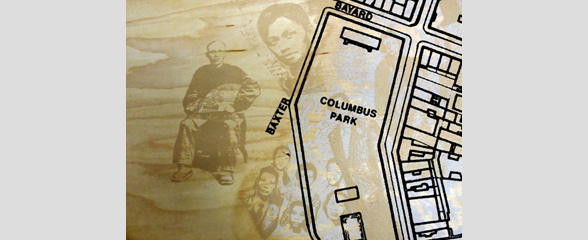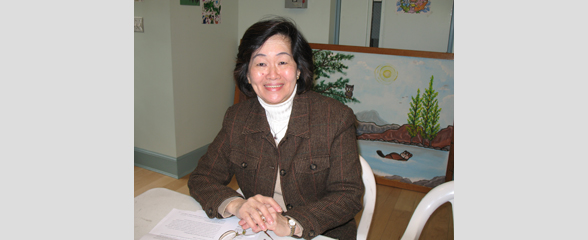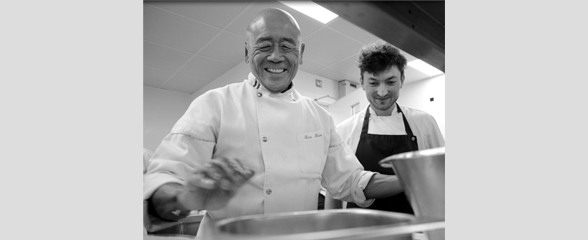Immigrant families

2008.040.002 Oral History Interview with Jenny Ye February 2, 2008
Jenny Ye was born in Manhattan in 1991, and has been a resident of Chinatown her whole life. She actively volunteers and coordinates for community-oriented organizations such as Chinatown Youth Initiatives, Committee Against Anti-Asian Violence (CAAAV), Chinatown Literacy Project, and Asian Pacific American Youth Alliance (APAYA). Ye first became aware of gentrification at a Chinatown Tenant Union meeting. She visualizes Chinatown as having aged low-rise buildings, fire escapes, no elevators, and inhabited by mostly immigrant families. When asked to define gentrification, she envisions tall buildings, the process of uprooting low-income communities and shifting them elsewhere to give privilege to more affluent residents who are able to afford the renovated real estate. Ye argues that gentrification does not solve issues with safety, crime, sanitation, and poverty because it merely relocates it to another neighborhood. However, she also empathizes with landlords because her parents, who have investments in real estate, rely on gentrification and the ability to raise rent in order to sustain the family’s quality of life. Finally, Ye talks about the changes in Chinatown, claiming that it is now shrinking, and explains that the changes occurred without consideration for the neighborhood’s businesses and residents; in other words, she fears that gentrification will transform Chinatown into “South SoHoâ€.

2008.040.010 Oral History Interview with Han Ho Tran March 13, 2008
Mr. Tran emigrated from Vietnam and settled in Brooklyn, New York in 1990, three years after which he opened a family grocery business. Even though he had contracted a five-year lease that was projected to last until 2003, a new landlord took over the building in 1999 at which time Tran received an eviction notice. Ultimately, after seven years of successfully running his grocery business, Tran lost his grocery store—and with it his source of income—over a rent dispute. According to Tran and his attorney, he presented all necessary documentation in court to prove that he was leasing only one property space and had paid his monthly rent in a timely fashion. Unfortunately, Trans initial trial attorney specialized in criminal law not tenant and landlord disputes, and Tran was overruled after his new landlord produced two fraudulent documents which claimed that Tran had agreed to lease two property spaces and was thus deficient in one of the rent payments.
Tran was evicted and lost all of his business property and assets, which were confiscated by the new landlord. He has spent the last seven years fighting the case with little success. During his interview, Tran vocalizes his concerns regarding business closures, informing residents about their rights, and achieving a fair justice system. Tran believes this is a common situation in Chinatown today but that few are willing to fight as he has done.

2008.040.013 Oral History Interview with Larry Goodman December 16, 2007
Larry Goodman, todays owner of his familys corporation Grand Machinery Exchange, Inc., recounts how his first generation Polish grandfather founded the company in 1927. Goodmans father Jerry and uncle Isidore took control of the business in 1947, and Larry Goodman later succeeded his father in 1983. According to Goodman, Centre Street machinery dealers were predominantly Jewish and were often afraid of non-Jewish “outsiders.†These business men were concerned with gaining respect and carried physical and psychological hardships because of this work ethic. Goodman also recalls the mixture of unity and intense competition between Jewish and Italian machinery dealers, the whole of which was referred to as the “forty thieves,†since most of the dealers were considered unrefined and were occasionally accused of having questionable business ethics.
Goodman reminisces about Chinatown as the industrial center of Manhattan, where he saw gradual sociological changes between the 1950s and 2000, including industry, hardware, and supporting retail spaces systematically leaving the area. Goodman sold the Grand Machinery Exchange shop building in 2005, explaining that business was no longer viable on Centre Street. He also notes the growing presence of Chinese-owned businesses on Centre Street, incorporating the neighborhood as a part of Chinatown rather than SoHo. Goodman reflects on how Centre Street has cycled through machinery and manufacturing, the garment industry, living-working spaces for creatives, and now finally to expensive developments. Furthermore, when asked to imagine the future of Chinatown, Goodman argues that money will dictate the outcome as part of a natural economic cycle. In his eyes, wealthy populations will move into the area, demand more luxury services and support and retail to accommodate their lifestyle and living spaces, and replace “mom and pop†establishments that can no longer afford to remain there.

2008.040.019 Oral History Interview with Ho Ying Pang March 16, 2008
Pang Ho Ying was born in Taishan, China, but grew up and spent a large portion of his life in Hong Kong until he moved to New York with his wife in 1988. Interestingly, his family was divided on both the East and West coasts: he and his two brothers settled in New York, while his two sisters moved to San Francisco. Pang vaguely remembers his first impression of New York upon his arrival as relatively less modern than Hong Kong, claiming that Chinatown appeared backwards since it lacked the modern buildings and technology of Hong Kong. Regardless, Pang perceived Chinatown as a friendly and supportive environment that deeply valued family relationships and friendships.
Though Pang did not plan or arrange employment in the United States before immigrating, he trusted he would find a suitable job. After two months, he found work through his younger brother as a general handyman or “gofer†at the Music Palace theater. Pang eventually became the director of the theater and managed the daily operations until he retired. In his interview, Pang walks through the history of the Music Palace and offers his opinions on what ultimately brought about the movie theater’s demise in 2000. Pang asserts that the reason the theater went out of business was because it was no longer in demand after the popularization of the relatively cheaper videotape rental. As the theater began running deficits and attendance records started dwindling, Pang recommended to the Hong Kong based theater owners that the business close its doors, bringing an end to the last movie theater that specialized in Hong Kong cinema in the United States. Pang recognizes the pragmatic reasons for closing the Music Palace but still expresses regret that the theater could no longer serve as a community gathering place for residents and visitors alike.
Pang goes on to identify some of the changes that he has witnessed in Chinatown more broadly, particularly that many old buildings had been upgraded and renovated, empty and vacant lots had gradually been built up, rent prices had skyrocketed, and the general aesthetics of the neighborhood had improved. He also hints at a generational shift and ethnic tension, comparing the new wave of Fukienese immigrants with the older generation of mainland Chinese immigrants to the neighborhood. While Pang notes that his children do not desire to return to Chinatown, he still explains that he hopes to remain living in Chinatown because of its convenient location, the Chinese food and tea, and general familiarity.

2008.040.025 Oral History Interview with Connie Ling February 12, 2008
Connie Ling, born in the Philippines and later a resident of Hong Kong during the 1960s, summarizes her experiences emigrating with her husband from Hong Kong to New York in 1967. Ling initially lived and worked in Chinatown, where she found employment as a machine operator in a garment factory. During her ten years working for the garment industry, Ling recalls an influx of Chinese immigrants and substantial growth in industrial businesses. After serving as a factory chairwoman for several years, she was eventually recruited as a union representative for UNITE in 1982, speaking for workers rights and mediating conflicts between workers and employers. At the time of her interview, Ling estimated that there were only approximately 100 union garment factories left. She attributes this decrease to the aftermath of September 11th, which caused commercial rent to double and garment industries to outsource labor to Sri Lanka, Mexico, and China. Ling also talks about the gentrification in Chinatown, stating that new condominiums are replacing old shops and factories while rent inflation is forcing old residents to move out of Chinatown. She goes on to note the growth among the Fukienese and Puerto Rican immigrant populations in the Lower East Side and expresses discontent with the growing number of Caucasian residents in Chinatown. Ling concludes by reflecting on how Chinatown’s garment industry is not likely to return due to significant changes in manufacturing and rent.

2008.040.027 Oral History Interview with Sing Kong Wong February 8, 2008
After being petitioned by his wifes family, Sing Kong Wong, a former administrator for a government agency in China, immigrated to New York in 1980 where he worked as a presser in a garment factory. Wong illustrates the poor working conditions in the garment factories, commenting on the lack of sanitation, violations of workers rights, and inadequate benefits and welfare. He explains how the steady decline in the garment industry has been especially problematic for immigrant populations, as they are unable to find other jobs and have limited financial means to pay the rising rent. Wong believes that the decline in garment factories began with the U.S. legislation that permitted jobs to be outsourced to Mexico, China, and India. After the events of September 11th, the situation worsened as landlords demanded higher rent and as zoning changed residential areas to commercial and business spaces.
Wong mentions that as a way to remember his past life and to share important life lessons with future generations, he has photographed personal and historically significant subjects and occurrences relevant to his life and experiences. Such subjects include the harsh conditions in garment factories, life in Chinatown, and the events of September 11th. He continues to describe the changes in Chinatown occurring over the past thirty years, like the improving tolerance and relationships between ethnic and provincial groups and the greater appreciation for Chinese culture and traditions.
Finally, Wong elaborates on his views regarding gentrification, worrying that people with lower-incomes will suffer the consequences of uncontrolled rent prices, eviction, real estate development, and a poor job market. He suggests that the government should be more involved in maintaining the parks, providing more recreational programs for the community, and fixing local traffic problems. Wong asserts that progressive and proportionate improvements are necessary, but these improvements must serve all residents and not just the wealthy.

2016.037.011 Oral History Interview with Ken Hom 2015/10/29
In his interview, renowned chef Ken Hom recounts his life story from growing up in Chicagos Chinatown to his later success, including teaching at the California Culinary Academy and publishing his two successful cookbooks East Meets West and Taste of China. He expresses his passion for food and his excitement at the globalization of food culture as Chinese and Asian food gains respect and recognition abroad. He shares his views on the future of the culinary arts as well as the meaning of food on a personal level, covering topics such as fusion cooking and cooking techniques from around the world.

2016.037.012 Oral History Interview with Vivian Ku 2015/12/15
Vivian Ku, owner of the fast-casual Taiwanese restaurant Pine & Crane, talks about her journey to opening up her restaurant and the decisions she made along the way. She particularly details how her familys background and her grandmothers cooking influenced what dishes she puts on her menu and what type of restaurant she wishes to run. Her belief in the family values behind the Chinese food culture continues to drive her down the path as a restauranteur.

2016.037.024 Oral History Interview with Jason Wang 2015/10/23
Jason Wang was born in XiAn, China and moved to the U.S. when he was eight years old. Wang and his family lived in various suburban communities during his childhood while his father worked at different Chinese restaurants. Wang’s father eventually opened a bubble tea franchise that later evolved into their successful XiAn Famous Foods restaurant. After spending college breaks helping his father at the bubble tea shop and feeling ungratified by his post-graduation corporate job, Wang decided to begin his career as a restauranteur with his father. Wang helped his father update XiAn Famous Foods by translating its menu into English and creating a website for the business. The original Flushing, Queens location developed a solid fanbase and saw even greater success after Anthony Bourdain mentioned the eatery on his hit television show No Reservations in 2008. Since then, XiAn Famous Foods has expanded to over ten locations across New York City five boroughs. Wang is proud to have pioneered the previously unknown street cuisine of his hometown in America. He hopes that their “fast-casual†restaurant model will enable them to expand to other regions in the U.S. and introduce an increasingly adventurous American public to Xian classics like their iconic liang pi “cold-skin noodles.â€